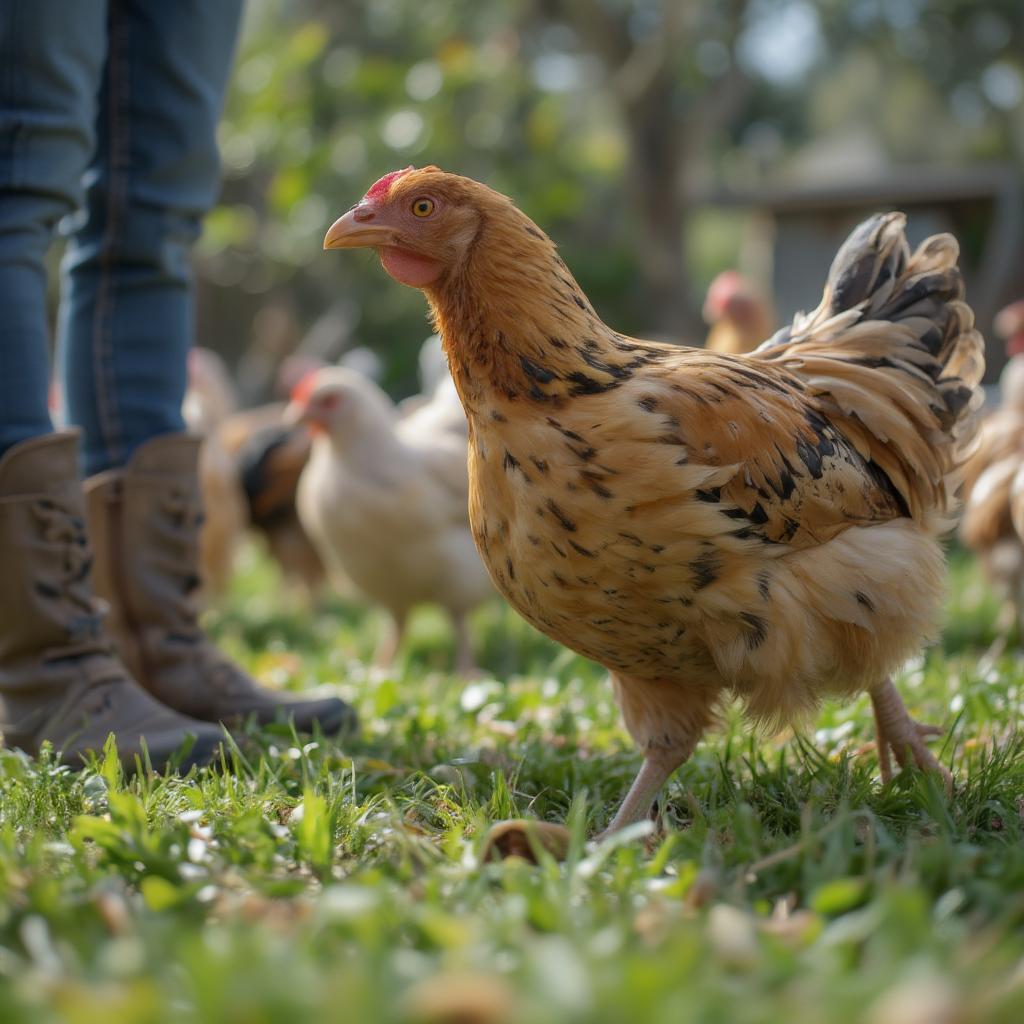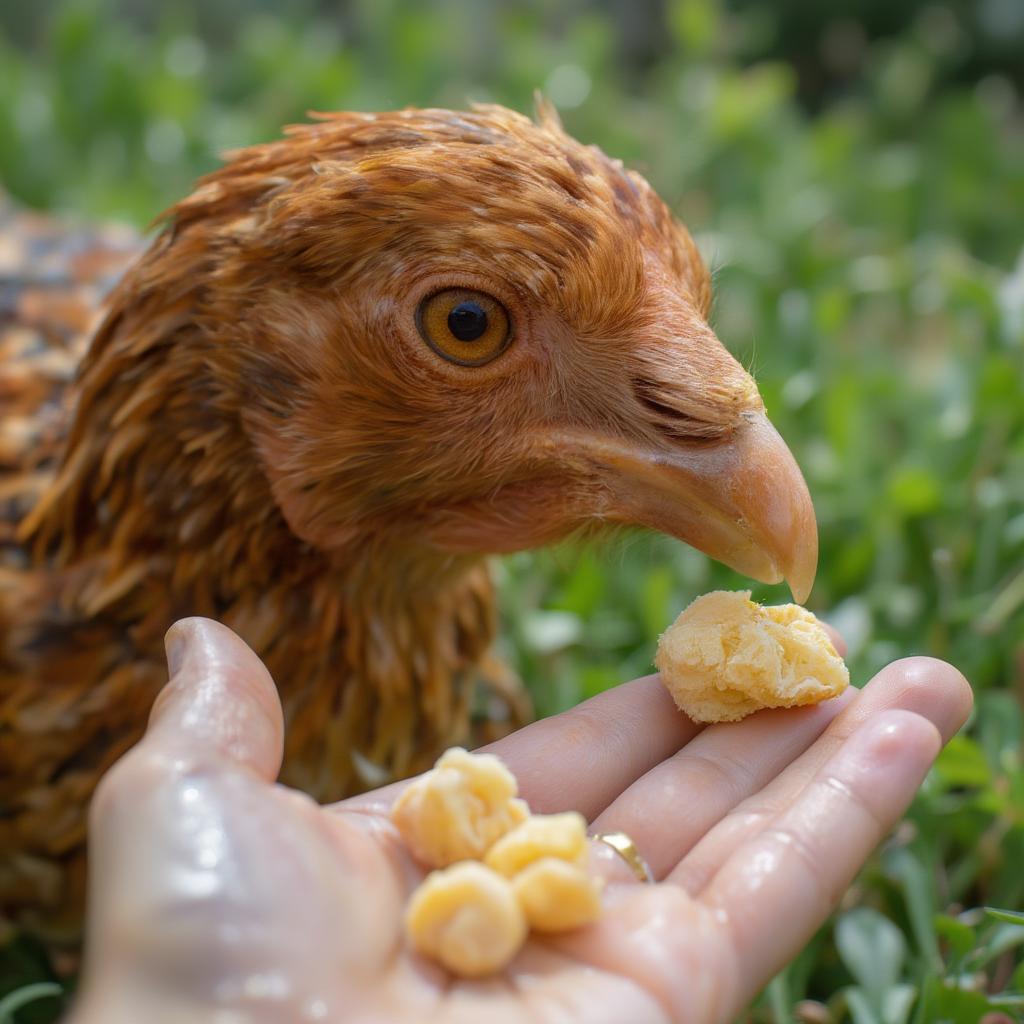Do Chickens Love Their Owners? This question pecks at the curiosity of many backyard chicken keepers. While chickens may not express affection in the same way as a cuddly dog or cat, they are capable of forming bonds and showing attachment to their human caregivers. Understanding their behavior is key to deciphering these complex feathered creatures.
Understanding Chicken Affection: It’s Not All Cuddles and Kisses
Chickens aren’t known for their overt displays of love, but that doesn’t mean they’re incapable of it. Their affection is expressed through subtle behaviors, often misinterpreted as simple instinct. These behaviors can range from following you around the yard to gentle pecking and even soft clucking when you’re near. Recognizing these nuances is key to understanding the chicken-human bond.
How Chickens Show They Care
Chickens demonstrate their bond with their owners in a variety of unique ways. While not as obvious as a dog’s wagging tail, these subtle cues reveal a deeper connection.
- Following You Around: Just like a devoted puppy, a chicken who enjoys your company might follow you around the yard. They might be hoping for a treat, but they also find comfort and security in your presence.
- Gentle Pecking: This isn’t aggression! A gentle peck can be a sign of affection, a way of preening you, or even a request for attention.
- Soft Clucking: A content chicken will often make soft clucking sounds when near their favorite human. It’s their way of communicating contentment and connection.
- Running to Greet You: If your chickens come running when they see you, it’s a good sign they associate you with positive experiences, like feeding time or treats.
 Chicken Following Owner in the Yard
Chicken Following Owner in the Yard
Do Chickens Recognize Their Owners? The Science Behind the Bond
Research suggests chickens are surprisingly intelligent creatures capable of recognizing over 100 different faces of both humans and animals. They can also understand complex social dynamics within their flock. This cognitive ability allows them to form unique bonds with individuals, including their human caregivers. They may not shower you with slobbery kisses, but they definitely know who you are.
The Role of Routine and Positive Reinforcement
Just like with any animal, positive reinforcement plays a vital role in building a strong bond with your chickens. Consistent feeding schedules, offering treats, and gentle handling all contribute to a positive association with you. This creates a sense of trust and security, leading to stronger bonds and more apparent displays of affection.
 Chicken Eating a Treat from a Hand
Chicken Eating a Treat from a Hand
Debunking the Myth of the Unloving Chicken
Some believe chickens are solely motivated by food, but this is a simplification. While food is a strong motivator, it’s not the only factor influencing their behavior. Chickens are social creatures who crave interaction and can develop genuine fondness for their human companions.
“Chickens, like any animal, thrive on positive interactions,” says Dr. Emily Carter, a poultry behaviorist. “Building trust and providing a stimulating environment is key to fostering strong bonds.”
Creating a Loving Environment for Your Chickens
Providing a safe, enriching environment is crucial for happy and affectionate chickens. This includes:
- A spacious coop with comfortable nesting boxes.
- A secure outdoor run for foraging and exploring.
- A varied diet of quality feed and healthy treats.
- Regular interaction and gentle handling.
“Don’t underestimate the power of gentle talking and spending time with your flock,” adds Dr. Carter. “These simple acts can significantly impact their well-being and strengthen your bond.”
Do Chickens Love Their Owners? The Answer is Complex.
So, do chickens love their owners? The answer isn’t a simple yes or no. While they may not express love in the traditional sense, chickens are capable of forming strong bonds and showing affection through subtle yet meaningful behaviors. Understanding these behaviors, providing a positive environment, and consistent interaction can cultivate a rewarding relationship with your feathered friends.
FAQ
-
Can chickens be trained? Yes, chickens can be trained to perform simple tricks and follow commands with positive reinforcement.
-
How long do chickens live? The average lifespan of a chicken is 5-10 years, depending on the breed and living conditions.
-
Do chickens need a rooster? No, hens will lay eggs without a rooster. A rooster is only needed for fertilization.
-
Are chickens good pets? Chickens can make wonderful pets for those willing to provide proper care and attention.
-
What do chickens eat? Chickens should be fed a balanced diet of commercial chicken feed, supplemented with fresh fruits, vegetables, and occasional treats.
Further Exploration
- Learn more about chicken breeds on our website.
- Explore tips for raising happy and healthy chickens.
For any further assistance, please contact us at Email: contact@daiduongtranhba.com, Address: Michigan Ave, Suite 3100, Chicago, IL 60611, USA. We have a 24/7 customer support team.

